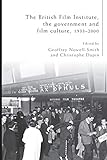The British Film Institute, the government and film culture, 1933-2000 / edited by Geoffrey Nowell-Smith and Christophe Dupin
Material type: TextLanguage: English Publisher: Manchester, UK ; New York : Manchester University Press, 2014Edition: Paperback editionDescription: xvi, 331 pages : illustrations ; 24 cmContent type:
TextLanguage: English Publisher: Manchester, UK ; New York : Manchester University Press, 2014Edition: Paperback editionDescription: xvi, 331 pages : illustrations ; 24 cmContent type: - text
- unmediated
- volume
- 9780719095740 (pbk.)
- 0719095743 (pbk.)
- PN 1993.5 B862 2014
| Item type | Current library | Home library | Collection | Shelving location | Call number | Copy number | Status | Date due | Barcode |
|---|---|---|---|---|---|---|---|---|---|
 Libro
Libro
|
Biblioteca Juan Bosch | Biblioteca Juan Bosch | Humanidades | Humanidades (4to. Piso) | PN 1993.5 B862 2014 (Browse shelf(Opens below)) | 1 | Available | 00000183174 |
Browsing Biblioteca Juan Bosch shelves, Shelving location: Humanidades (4to. Piso), Collection: Humanidades Close shelf browser (Hides shelf browser)

|

|

|

|

|

|

|
||
| PN 1993.5 B815c 2023 Colores de cine : la historia del séptimo arte en 50 películas / | PN 1993.5 B827 1995 Brazilian cinema / | PN 1993.5 B846h 2012 La Historia a Través del Cine : 10 Propuestas Didácticas para Secundaria y Bachillerato | PN 1993.5 B862 2014 The British Film Institute, the government and film culture, 1933-2000 / | PN 1993.5 B864f 1990 The films of the eighties / | PN 1993.5 B876w 1990 Working in Hollywood / | PN 1993.5 B895ci 2009 Il cinema italiano di regime : da "La canzone dell'amore" a "Ossessione," 1929-1945 / |
Originally published: 2012.
Includes bibliographical references (pages 310-318) and index.
Editors' Introduction1. Foundation and early years – Geoffrey Nowell-Smith2. Post-War Renaissance – Geoffrey Nowell-Smith3. 'Je t'aime – moi non plus': Ernest Lindgren and Henri Langlois – Christophe Dupin4. The BFI and Film Exhibition, 1933–70 – Christophe Dupin5. The Vanguard of film Appreciation: the Film Society movement and film Culture, 1945–65 – Richard MacDonald6. From the 1964 Labour government to the 1970 BFI Crisis – Geoffrey Nowell-Smith7. The view from the regions – Melanie Selfe8. Paddy Whannel and BFI Education – Terry Bolas9. The 1970s – Geoffrey Nowell-Smith10. The Smith years – Geoffrey Nowell-Smith11. The BFI and film production: half a century of innovative independent film-making – Christophe Dupin12. The BFI and television – Richard Paterson13. The Sight and Sound story – Geoffrey Nowell-Smith14. A public showcase for the BFI: the Museum of the Moving Image – Lorraine Blakemore15. Towards the Millennium – Geoffrey Nowell-Smith16. EpilogueBibliographyIndex.
From a modest start in the 1930s, the British Film Institute (BFI) grew rapidly after the war to encompass every kind of film-related activity. This book examines the interplay of external and internal forces that led to the BFI's unique development as a multi-faceted public body.


There are no comments on this title.